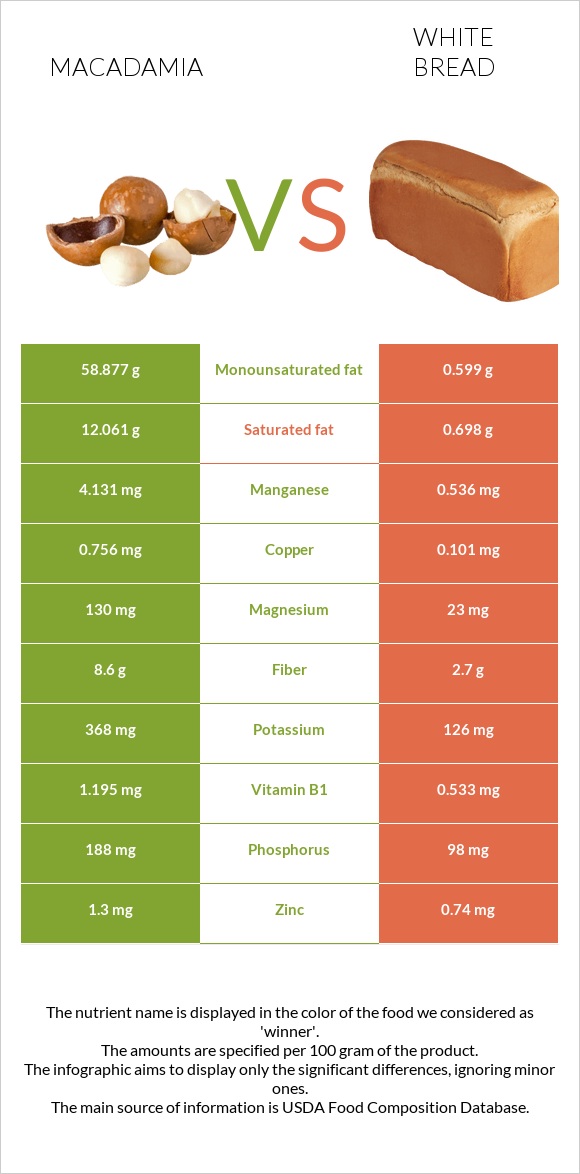Macadamia vs. White bread — In-Depth Nutrition Comparison
Compare
Significant differences between macadamia and white bread
- Macadamia has more manganese, copper, vitamin B1, magnesium, fiber, and vitamin B6; however, white bread is richer in selenium and folate.
- Macadamia covers your daily manganese needs 156% more than white bread.
- White bread has 17 times less saturated fat than macadamia. Macadamia has 12.061g of saturated fat, while white bread has 0.698g.
- White bread has a higher glycemic index. The glycemic index of white bread is 73, while the glycemic index of macadamia is 10.
Specific food types used in this comparison are Nuts, macadamia nuts, raw and Bread, white, commercially prepared (includes soft bread crumbs).
Infographic

Infographic link
Mineral Comparison
Mineral comparison score is based on the number of minerals by which one or the other food is richer. The "coverage" charts below show how much of the daily needs can be covered by 300 grams of the food.
| Contains more MagnesiumMagnesium | +465.2% |
| Contains more PotassiumPotassium | +192.1% |
| Contains more CopperCopper | +648.5% |
| Contains more ZincZinc | +75.7% |
| Contains more PhosphorusPhosphorus | +91.8% |
| Contains less SodiumSodium | -99% |
| Contains more ManganeseManganese | +670.7% |
| Contains more CalciumCalcium | +69.4% |
| Contains more SeleniumSelenium | +511.1% |
Vitamin Comparison
Vitamin comparison score is based on the number of vitamins by which one or the other food is richer. The "coverage" charts below show how much of the daily needs can be covered by 300 grams of the food.
| Contains more Vitamin CVitamin C | +∞% |
| Contains more Vitamin EVitamin E | +145.5% |
| Contains more Vitamin B1Vitamin B1 | +124.2% |
| Contains more Vitamin B5Vitamin B5 | +41.4% |
| Contains more Vitamin B6Vitamin B6 | +216.1% |
| Contains more Vitamin B2Vitamin B2 | +50% |
| Contains more Vitamin B3Vitamin B3 | +93.3% |
| Contains more FolateFolate | +909.1% |
All nutrients comparison - raw data values
| Nutrient |  |
 |
DV% diff. |
| Manganese | 4.131mg | 0.536mg | 156% |
| Monounsaturated fat | 58.877g | 0.599g | 146% |
| Fats | 75.77g | 3.33g | 111% |
| Copper | 0.756mg | 0.101mg | 73% |
| Vitamin B1 | 1.195mg | 0.533mg | 55% |
| Saturated fat | 12.061g | 0.698g | 52% |
| Selenium | 3.6µg | 22µg | 33% |
| Magnesium | 130mg | 23mg | 25% |
| Folate | 11µg | 111µg | 25% |
| Fiber | 8.6g | 2.7g | 24% |
| Calories | 718kcal | 266kcal | 23% |
| Sodium | 5mg | 490mg | 21% |
| Starch | 1.05g | 37.17g | 15% |
| Vitamin B3 | 2.473mg | 4.78mg | 14% |
| Vitamin B6 | 0.275mg | 0.087mg | 14% |
| Phosphorus | 188mg | 98mg | 13% |
| Carbs | 13.82g | 49.42g | 12% |
| Potassium | 368mg | 126mg | 7% |
| Calcium | 85mg | 144mg | 6% |
| Vitamin B2 | 0.162mg | 0.243mg | 6% |
| Zinc | 1.3mg | 0.74mg | 5% |
| Vitamin B5 | 0.758mg | 0.536mg | 4% |
| Choline | 14.6mg | 3% | |
| Fructose | 0.07g | 2.43g | 3% |
| Protein | 7.91g | 8.85g | 2% |
| Vitamin E | 0.54mg | 0.22mg | 2% |
| Vitamin C | 1.2mg | 0mg | 1% |
| Iron | 3.69mg | 3.61mg | 1% |
| Polyunsaturated fat | 1.502g | 1.602g | 1% |
| Net carbs | 5.22g | 46.72g | N/A |
| Sugar | 4.57g | 5.67g | N/A |
| Vitamin K | 0.2µg | 0% | |
| Trans fat | 0.027g | N/A | |
| Tryptophan | 0.067mg | 0% | |
| Threonine | 0.37mg | 0% | |
| Isoleucine | 0.314mg | 0% | |
| Leucine | 0.602mg | 0% | |
| Lysine | 0.018mg | 0% | |
| Methionine | 0.023mg | 0% | |
| Phenylalanine | 0.665mg | 0% | |
| Valine | 0.363mg | 0% | |
| Histidine | 0.195mg | 0% | |
| Omega-3 - EPA | 0g | 0.001g | N/A |
| Omega-3 - ALA | 0.166g | N/A | |
| Omega-6 - Eicosadienoic acid | 0g | 0.002g | N/A |
Macronutrient Comparison
Macronutrient breakdown side-by-side comparison
Protein:
7.91 g
Fats:
75.77 g
Carbs:
13.82 g
Water:
1.36 g
Other:
1.14 g
Protein:
8.85 g
Fats:
3.33 g
Carbs:
49.42 g
Water:
36.42 g
Other:
1.98 g
| Contains more FatsFats | +2175.4% |
| Contains more ProteinProtein | +11.9% |
| Contains more CarbsCarbs | +257.6% |
| Contains more WaterWater | +2577.9% |
| Contains more OtherOther | +73.7% |
Fat Type Comparison
Fat type breakdown side-by-side comparison
Saturated fat:
Sat. Fat
12.061 g
Monounsaturated fat:
Mono. Fat
58.877 g
Polyunsaturated fat:
Poly. Fat
1.502 g
Saturated fat:
Sat. Fat
0.698 g
Monounsaturated fat:
Mono. Fat
0.599 g
Polyunsaturated fat:
Poly. Fat
1.602 g
| Contains more Mono. FatMonounsaturated fat | +9729.2% |
| Contains less Sat. FatSaturated fat | -94.2% |
~equal in
Polyunsaturated fat
~1.602g
Carbohydrate type comparison
Carbohydrate type breakdown side-by-side comparison
Starch:
1.05 g
Sucrose:
4.43 g
Glucose:
0.07 g
Fructose:
0.07 g
Lactose:
0 g
Maltose:
0 g
Galactose:
0 g
Starch:
37.17 g
Sucrose:
0 g
Glucose:
1.57 g
Fructose:
2.43 g
Lactose:
0 g
Maltose:
1.67 g
Galactose:
0 g
| Contains more SucroseSucrose | +∞% |
| Contains more StarchStarch | +3440% |
| Contains more GlucoseGlucose | +2142.9% |
| Contains more FructoseFructose | +3371.4% |
| Contains more MaltoseMaltose | +∞% |
~equal in
Lactose
~0g
~equal in
Galactose
~0g





